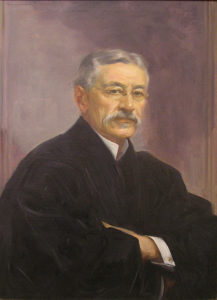Frank A. Monroe
Frank Adair Monroe served as the chief justice of the Louisiana Supreme Court from 1914 to 1922.

Courtesy of The Law Library of Louisiana
Frank Adair Monroe. Adams,M. (Artist)
Frank Adair Monroe was the tenth chief justice of the Louisiana Supreme Court, a position he achieved after working his way up through the judicial system. In 1872, at the young age of twenty-eight, Monroe was elected judge of the Third District Court for the Parish of Orleans, but because of the political complications of Reconstruction, he was removed from office by Gov. P. B. S. Pinchback on December 17, 1872. Monroe was reelected to the same court in 1876 and took office on January 9, 1877, under commission from Gov. Francis T. Nicholls. Under the Constitution of 1879, Monroe was appointed by Gov. Louis A. Wiltz as judge of the newly created Civil District Court for the Parish of Orleans. He remained on this court and became the presiding judge in 1888, until he was appointed associate justice of the Supreme Court by Gov. Murphy J. Foster in 1899 to succeed the late Henry Carleton Miller. Under Act 137 of 1904, Monroe was elected associate justice, without opposition, in 1908. He became chief justice by reason of seniority and was reelected in 1918. He retired from the court in January 1922 after forty-five years of judicial service.
Monroe was born August 30, 1844, to Victor and Mary Townsend Polk Monroe in Annapolis, Maryland, at the home of his mother’s family. His father, Victor Monroe, was appointed the first federal judge for the territory of Washington but died en route to his post on the Pacific coast. His grandfather, Thomas Bell Monroe, was a professor of law at the University of Louisiana as well as a judge of the United States District Court for the District of Kentucky. Monroe spent his first twelve years in Frankfort, Kentucky, and received his early education in Kentucky and Maryland. When the Civil War broke out, Monroe was a cadet at the Kentucky Military Institute, and he quickly left school to join the Confederate army. After being badly wounded in 1863, he was captured and detained as a prisoner for eight months.
After the war, Monroe moved to New Orleans, where he read law in the office of Henry J. Leovy. He was admitted to the Louisiana bar in 1867 before launching his career as a jurist, culminating as chief justice.
Monroe was active in the anti-lottery campaign of 1892 and served as a member of the Constitutional Convention of 1898. Like his grandfather, Monroe was a professor of law at Tulane University Law School. After his retirement from the Louisiana Supreme Court, he became associated as counsel with the New Orleans law firm of Monroe and Lemann.
Monroe was married on January 3, 1878, to the former Alice Blanc, and they had five sons and five daughters. During World War II, a “liberty ship” built in New Orleans at Delta Shipbuilding was named the Frank Adair Monroe in his honor. He died on January 16, 1927; funeral services were held at Trinity Episcopal Church on January 18, And Monroe was buried in Metairie Cemetery in New Orleans.
